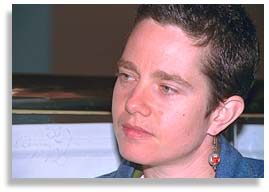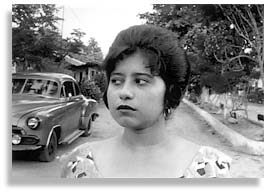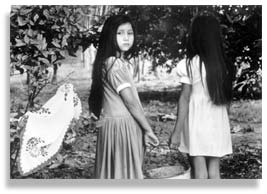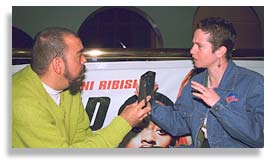|
Introduction
Paulina "Paulina, a narrative documentary by Vicki Funari and Jennifer Maytorena Taylor furiously skips across a green, fetid Mexican canal of memory, emotion, and color. Color, most notably the dark toasty brown of Paulina's skin, and green the color of lies, betrayal, and the murky emotional relationships we sometimes have with our families, takes on a strong somewhat mystical presence in this film. (The film is) a story about Paulina Cruz Suarez, a girl cursed by lies at a young age and sold by her parents into a life of pain and servitude. The film manages to capture Paulina's journey through life to a somewhat happy ending, but also to show us how, for Paulina at least, being bitter and holding on to painful memories was helpful, therapeutic, and soothing. “Don't let go!” this film seems to say: make your life a collage of feelings, a montage of pain, pleasure and confusion. "Don't let go!" this film shows us this through a strong story and great performances -- all under the eccentric accomplished direction of Vicki Funari." -- Fred Salas, co-director, San Diego Latino Film Festival, June 25,1999 Exploration of a life Fred Salas: Where did you get the idea for this film? Vicky Funari: I grew up in Mexico and during part of the time that we were there, Paulina was my family’s maid. She was my second mom. Her daughter Rosa Maria was like a little sister for me. We left Mexico when I was eleven years old and we went to the United States. Even though I was from the U.S., I hadn’t lived there much so I had a very very hard period of culture shock. I missed Paulina, and I missed Rosa Maria and I felt like part of my family had been taken away.So, I grew up, and by the time I was a young adult I wanted to go back to Mexico. I thought I was going there to cure the nostalgia I had built up around Mexico. But what ended up happening was I went back and I went to see Paulina and during the very first visit she sat me down and started telling me the story of her life. This did a few things for me. One, I felt like she really opened this door between our lives and our worlds, and let me in a way that she didn’t have to do. I wasn’t asking her to do it - she just did it. And another thing that it did was that it let me in on an understanding that we had never known her. This woman who we called “part of the family” and who I thought of as my second mom and whose daughter had been “my little sister” -- they were strangers to us. That mattered. It mattered for a lot of reasons. I wanted to find out why.The film began as an exploration of her life, but definitely the impulse on my side was wanting to know why had she been invisible to us. I thought the film was going to be focused around her relationship with her employers, around that invisibility. I thought that the use of multiple perspectives was going to be a lot about their perspectives of her. But what happened was that once she started telling me this story, and when she started saying what was important for her in the film, it all focused on her early life. In fact her family and the people in her town did exactly the same thing to her that her employers had done which is not see her. Basically they turn her into in what they want her to be. Not let her be who she is.That’s how the film got started. "Las gringas locas"
Vicky Funari: It’s been very rewarding to see how the film has been received. We spent ten years making it. The "we" here is myself and Paulina, and Jennifer Maytorena Taylor who is the co-producer and co-creator. I worked on it for ten yeas, Jennifer for five. You know after a certain period of time you are just going on because you have to get it done. You stop enjoying it. You get frustrated and you want it to be done. You kind of forget that it’s ever going to be out there.Also as the years went by I began to lose some of my emotional response to the material. I forgot it was an emotional film, though I had stayed intellectually engaged with it. What happened for me that was really interesting was when the film started to be seen by audiences, and after every screening there would be people crying. I was really surprised.It was incredibly gratifying, and more than anything else gratifying because of how it made Paulina feel. She came to a lot of the first festival screenings. She’s traveled with the film a fair amount. She always thought we were crazy. “Why would anyone want to see anything about my life?” “Las gringas locas.” She thought people would laugh at her. She was really afraid that people would laugh at her because that was exactly what happened to her when she was little.What happened instead was people embraced her. They embrace who she is and they embrace the fact that she had the courage to make this film. At every screening there’s always an audience member who comes up to her afterwards and needs to tell her their story. They go off in a corner. There was one guy in San Francisco who was just crying, sobbing, tears running down his face. They talked for half an hour.Paulina has actually come into a whole different feeling herself about the film and that’s been good for me. I completely disrupted her life to make this film. I wanted it to be positive for her. But you never know if it will be or not. Fred Salas: It sounds like it has been. Were you afraid of that? I’ve thought about that a lot of times when I’ve seen documentaries about particular people. I keep thinking about one documentary about prisoners. When the documentary is made there’s lot of attention. But what happens to them when that lime light is gone. After those first couple of festivals, they are celebrities and everyone wants to talk to them. But then what happens? Do you think Paulina has survived that? Vicky Funari: We’re in exactly the stage that you are talking about right now when after a year of attention and traveling and being a celebrity that is winding down. It used to be that I would call her, email her, to tell her that next month somebody wants you to go to New York. And now I’m calling her and saying we are doing really well, the film is getting out there but there’s no travel coming up. It’s hard for her. She’s really enjoyed the process and blossomed into this persona during the period of the initial screenings at film festivals. Yet she had to go home and do the laundry. Be a maid. The last time I talked to her she said she feels like a prisoner. Before, when she talked about being a maid, she’d say that even though the work isn’t the most fun in the world she always felt safe because she was enclosed in these houses. Now she’s talking about feeling like she’s in a prison. That’s a big change.We have a plan which we hope we are going to be able to implement. We are raising money so that in conjunction with the theatrical release of the film, which just began last month in San Francisco, Paulina will be able to travel with the film. We want to organize events in each city to kick off the release. Paulina will do panel discussions and dialogs with people in different community groups. That’s what she wants to do. She’s realized that she can help younger women and younger men who are either going through or have gone through similar things. She feels like she wants to inspire people and give advice and strength. We just have to raise the money so that she can do that.That’s one way that we hope it’s not going to just end for her. But on the other hand it is a documentary. It’s not like it’s going to make a ton of money. She knew and we knew, all along, that whatever happened with the film she would go on being a maid, and I would go on being an independent filmmaker. Fred Salas: You touched on something a little earlier that I thought was really interesting. I guess all artists, especially with film, never know what the reaction to the work is going to be. Do you still worry about that? Does Paulina still worry about that? Vicky Funari: You never know what an audience is going to do. I usually wait through the first couple of scenes. By that time I usually have an in-general sense of whether the audience is with the film or not. The thing that happens to me mostly is that people like to come up and say how much they love the film, and even more so when Paulina is there. The people who hate the film -- I don't think they necessarily want to say so to your face. Although I actually have had a couple of good conversations with people who didn’t like the film. Those are some of my favorite conversations because then there’s something to get at and a problem to work on. To figure out why they didn’t like it. Where those difference are.It’s not a film that is that easy in terms of the way that it’s put together. It breaks with certain conventions and it does that intentionally. There have been people who have seen it and called it a docudrama and didn’t even get the level on which those narrative scenes aren’t meant to just be narrative scenes. Generally those people have not liked the film. Because they haven’t understood why that is there.We’ve had one bad review in the year and a half it’s been out. The rest has been really positive. "... problems. Real knotty problems that you have to try and get at."
Vicky Funari: It’s interesting that you say that because the film that made me realize that I was going to be a filmmaker was a film that I thought I hated. Which I didn’t hate for that long. I grew up watching normal Hollywood movies. I didn’t even know there was anything else out there. I started seeing slightly alternative films when I was a teenager. I went to see Picnic at Hanging Rock, which is not that weird of a movie. But, compared to what I had seen at that point, it was very different. The thing that it did that I had never seen before was that it did not answer the questions. You don’t leave that film knowing what happens. You are completely in the dark. When I left the theater, I think I was 16 or 17, I was furious. I was with friends and on the car ride home I was “it was so terrible, they ...”. I started listing why it was so horrible. And how frustrated I felt. And all of a sudden I went “wait a minute, this is one of the most interesting movies I’ve ever seen. It is like the books that I love, and the paintings that I love, the things that interest me in life, the things that are more complicated and not answered. It has problems. Real knotty problems that you have to try and get at. That night was the night I realized I wanted to make films. This was the first time I saw a film that actually left me working.I’m glad somebody didn’t like it and it made them think about it. Fred Salas: Have you been making films for a long time? Vicky Funari: Well I’ve been making Paulina for ten years.(both laugh.) I went to NYU (New York University) undergraduate film school. During my first year there I started interning with Lizzie Borden who had made Born in Flames and was in pre-production for Working Girls. I ended up assistant-directing Working Girls. I also produced a documentary that year called Alternative Conceptions about lesbians having children by donor insemination. That is now completely normal, but at the time there weren’t many women doing it -- especially on the East Coast. There were a lot more women on the West coast, but I was in New York.I was so traumatized by assistant-directing Working Girls that after I graduated from school I went to Nicaragua and Mexico. That’s when I saw Paulina again. I knew then that I needed to make this film. But I also knew I needed to do a lot of things first, including learning a lot more about film making.Eventually I moved to San Francisco and I’ve been working in the independent film world there ever since.The last piece that I directed was skin-es-the-si-a which is an experimental video about the cultural codification of the female body, explored through how we talk about the physical movement of the body. It uses footage of a woman who is both a performance artist and a peep show dancer. It's been around at festivals though it doesn't get a lot of play because it's eighteen minutes of a very naked body, and that means there's a limit of where it can be seen.
Vicky Funari: Thank you, that’s nice to say. For me the performances are the weak part of the film because I actually don’t know how to direct actors. I pretty much was winging it. I was happy with the performances that we got by and large, though a lot of what ended up on the cutting room floor was a few bad performances, not by any of the girls, but the guy who plays the cacique who had some weak moments. Ultimately, though, those were the fault of the director. I knew that I was going to have some trouble because I’d never done it before. In high school, I directed several plays but I never really think about that because it was so long ago, and it was theater which is a whole different thing.I have a very strong visual sense. I knew before I ever talked to the cinematographer and before we ever story-boarded the stuff out what certain shots had to look like. It was pretty easy to communicate that particular kind of information. But the performances were harder for me to figure out how to get the actors to do what I wanted. Those two younger girls were so easy to work with, especially the youngest child who’s only seven years old. Fred Salas: One last question, the color. - the color, texture and sound of it. For me it’s very cultural, very Mexican. Was that the intent? Or is it just part of your style? Or the look? Everything from the one sheet down is so beautiful. Vicky Funari: Thanks. In terms of how it looks, in terms of color, and how it sounds, yes, it’s because it’s Mexican and yes, it’s my style. Somehow they are one and the same. I was in Mexico from the time I was seven to the time I was eleven, and I actually felt that who I am as a person developed then. That was the time when I started that move from being a kid to being an adult. I have always felt that part of my need to go back there and to keep my contacts there, to keep that part of me alive had everything to do with the fact that I came to consciousness when I was living in Mexico. As far the aesthetics go, the choice of the bright colors and of trying to saturate the scenes with sound, not like big harsh sound but the sound of her town, of all the insects, all of that, if it comes out of anything it comes out of how I responded to Paulina’s story and the ways in which she and I are similar -- the way in which she and I respond to plants and animals and have a similar tactile relationship with them. The colors are trying to capture that place and what it feels like. Also her personality which is very vibrant and volatile. I wanted the colors to be as bright as she is. Published in In Motion Magazine July 24, 1999. |
||||||||||||||||||||||||||||||||||||||||||||||||||||||||||||
If you have any thoughts on this or would like to contribute to an ongoing discussion in the  What is New? || Affirmative Action || Art Changes || Autonomy: Chiapas - California || Community Images || Education Rights || E-mail, Opinions and Discussion || En español || Essays from Ireland || Global Eyes || Healthcare || Human Rights/Civil Rights || Piri Thomas || Photo of the Week || QA: Interviews || Region || Rural America || Search || Donate || To be notified of new articles || Survey || In Motion Magazine's Store || In Motion Magazine Staff || In Unity Book of Photos || Links Around The World NPC Productions Copyright © 1995-2020 NPC Productions as a compilation. All Rights Reserved. |
||||||||||||||||||||||||||||||||||||||||||||||||||||||||||||





